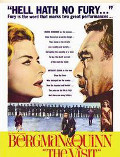
Directed by
Bernhard Wicki
100 minutes
Rated PG
Reviewed by
Bernard Hemingway

Visit, The (1964)
Although it is set in a fictional Eastern European town, in terms of both form and content The Visit is strongly reminiscent of, on the one hand, the satirical bent of Czech New Wave cinema of the mid-to-late ‘60s found in such films as Closely Observed Trains (1966) and Larks On A String (1969), and, on the other, the socially critical stance of Italian Neo-realism (it was filmed at Cinecittà) found in films such as Umberto D 1955 and Il Tetto (1957). Whilst the film is somewhat of an oddity in its mordant view of human nature it also has a unusual set of production credits. It was a French, Italian, German and American co-production, based on a play originally penned by a Swiss author,Friedrich Dürrenmatt, that was adapted for Broadway by Maurice Valency that in turn became the basis for black-listed screenwriter Ben Barzman's script, it was directed by Austrian actor-turned-director Bernhard Wicki and produced by Darryl F. Zanuck and Julien Derode, with Bergman and Quinn as co-producers.
Based on a 1956 play“Der Besuch der alten Dame” (The Visit of the Old Lady), it tells of Karla Zachanassian (Ingrid Bergman) who at the age of seventeen had been betrayed by Serge Miller (Anthony Quinn) after falling pregnant to him. He refused to acknowledge the child and she was forced to leave town in disgrace. Now, twenty years later, she is fabulously wealthy and has returned to seek her revenge. The town is on its druthers and Karla offers to bail it out if it executes Serge. Initially, her offer is indignantly dismissed as morally unacceptable but gradually the temptation of material well-being causes the townspeople to reconsider their position.
The common thread that runs through all these film is the jaundiced view of bourgeois propriety as a mixture of collusive self-interest, vanity and fear. In The Visit it is very much the main agenda. Everyone. even Serge’s wife is rotten with self-interest, the only exception is a serving girl, Anya, in whom Karla sees the girl she once was.
Despite being stylish made the necessary transformation of the town’s moral position feels forced; the relationship between Karla and Serge is unconvincing (in one scene in which she admits her love for him Karla abruptly dismisses him once she realizes that his hair is grey, something which has been perfectly apparent all along) and probably most grievously, the film changes the play’s ending, allowing Serge to live where in the play he had been lynched, thus not only effectively over-riding the supposed legality of the kangaroo court’s decision, but also the play’s more devastating logic.
Due to questionable make-up and lighting, Bergman often looks a fright (at 49 she is far too old to play a 37 year old, why didn't they simply adjust the dates? one wonders) even if her performance is effective. Quinn (equally too old) is rather incongruous as an Eastern European but the premise and realization are strong enough to hold one’s interest.
Show detailed review
Want something different?





